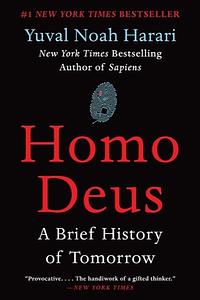You need to sign in or sign up before continuing.
Take a photo of a barcode or cover
informative
slow-paced
Almost stopped after introduction praised humanity for eliminating war and disease.. overall an interesting read with some interesting theories about where humanity may be heading. But at times felt like a book length shit-stirring blog post.
informative
reflective
slow-paced
Harari is an excellent scientist — he manages to portray complex political and historical scenarios in a way that is both easily understood and still neutral. He argues far removed from his own sources, leaves their interpretation almost completely open to his audience. While I greatly admire the skill and diligence he showed in this book (and I enjoyed listening to a lot of the different topics, especially AI and the soul/conscience debate) I missed a clear continuation between the different segments. At times it felt like I had been reading five or so vastly different books. Still, I learned a lot and I've come to understand why Harari has become one of the most important voices of the humanities in our time.
Graphic: War
Moderate: Sexism, Antisemitism
challenging
dark
informative
reflective
slow-paced
This is an extremely interesting book, full of fascinating insights into the world of history, science, data and AI. While I greatly enjoyed reading this book, I preferred the first novel ‘Sapiens.’ I will admit that this is perhaps due to the fact that I found the prophetic “moral of the story” to be downright depressing in Homo Deus. I may cling to “wishful thinking” and hope that the author is wrong in terms of what the future holds.
challenging
informative
inspiring
reflective
medium-paced
challenging
informative
reflective
medium-paced
challenging
dark
informative
mysterious
tense
fast-paced
A direct continuation of the mighty ‘Sapiens’, ‘Homo Deus’ furthers the ending ideals of the previous book and leaves you in shock of what our future may hold. This book surpassed the high expectations I already had and as Daniel Kahneman lucidly wrote “it will make you think in ways you had not thought before.”
An excellent book. Thought provoking, well-researched, did not miss a thing. And terrifying. Dissatisfied, irresponsible, and don't know what we want. That pretty much characterizes Homo sapiens for the majority of its history that we know of, and he poses a very unsettling question at the end: is there anything more dangerous?
I may have to revise this comment that I made after reading the first book: Sapiens -(I heard an interview with him on NPR, and I love his idea that our institutions are fictional, that therefore works of fiction can and do shape our world. So, yes, there really is hope.)
To begin with the end:.
1.) No, we are not just algorithms,
2.) Consciousness, is more important than purely calculative intelligence, and
3.) How important is the level of control given by society to various algorithms? It really depends on the algorithm (s) design, biases, objectives, and ability to self-correct based on universal human rights principles.
This is a very difficult book to rate, since I initially loved his style and even most of the content, which did not seem to be that big of a revelation given that he's drawing on known information. Yet toward the second half of the book and definitely toward the end of the book, there almost seems to be a feeling of bitterness. I used to believe in and be part of the Electronic Freedom Foundation back in the 90s, and I definitely believed in, and I think I still believe that, information wants to be free, but I certainly would never consider human beings to be mere algorithms.
I agree with his assessment that big data combined with biased algorithms can be problematic, and we are starting to see studies that show that the algorithms of many many systems are heavily biased, and it's a problem.
but I was just a bit shocked because I had not thought to put all of these different pieces of technology together in the way that he is portraying the possibilities. I do not necessarily believe that information wants to be free is the model of a new religion, but I do know many people who hang on the hopes of humanity on technology. And none of them grew up poor. So yes that does worry me. I believe he has a good point in pointing out that most of the studies and most of the bias in our big data and algorithms that use that data are any fever of well-to-do white people. This is one major reason that we need more women and people of color in technology. But his reasoning, and I hope he's right that his warnings may become a non-self-fulfilling prophecy that get short-circuited through corrective action, means that the average human being needs to be upgraded to education and urgently. So now more than ever we need adult education, we need people to pay attention to public library systems, continuing ed. and Free University for everyone, along with free transportation and healthcare and pro bono free legal and financial education, to help people to be able to pay attention to upgrading their educations. We need to be doing this on a massive scale. He is right that we are, in general, not paying attention to what needs to be paid attention to, like the emerging technologies and where they could head. We are all too busy being distracted by the extremely short-term problems. And who can blame us? But we must keep trying to look up and see that bigger picture from time to time, or, he is right, the train might get/stay on the wrong track.
To begin with the end:.
1.) No, we are not just algorithms,
2.) Consciousness, is more important than purely calculative intelligence, and
3.) How important is the level of control given by society to various algorithms? It really depends on the algorithm (s) design, biases, objectives, and ability to self-correct based on universal human rights principles.
This is a very difficult book to rate, since I initially loved his style and even most of the content, which did not seem to be that big of a revelation given that he's drawing on known information. Yet toward the second half of the book and definitely toward the end of the book, there almost seems to be a feeling of bitterness. I used to believe in and be part of the Electronic Freedom Foundation back in the 90s, and I definitely believed in, and I think I still believe that, information wants to be free, but I certainly would never consider human beings to be mere algorithms.
I agree with his assessment that big data combined with biased algorithms can be problematic, and we are starting to see studies that show that the algorithms of many many systems are heavily biased, and it's a problem.
but I was just a bit shocked because I had not thought to put all of these different pieces of technology together in the way that he is portraying the possibilities. I do not necessarily believe that information wants to be free is the model of a new religion, but I do know many people who hang on the hopes of humanity on technology. And none of them grew up poor. So yes that does worry me. I believe he has a good point in pointing out that most of the studies and most of the bias in our big data and algorithms that use that data are any fever of well-to-do white people. This is one major reason that we need more women and people of color in technology. But his reasoning, and I hope he's right that his warnings may become a non-self-fulfilling prophecy that get short-circuited through corrective action, means that the average human being needs to be upgraded to education and urgently. So now more than ever we need adult education, we need people to pay attention to public library systems, continuing ed. and Free University for everyone, along with free transportation and healthcare and pro bono free legal and financial education, to help people to be able to pay attention to upgrading their educations. We need to be doing this on a massive scale. He is right that we are, in general, not paying attention to what needs to be paid attention to, like the emerging technologies and where they could head. We are all too busy being distracted by the extremely short-term problems. And who can blame us? But we must keep trying to look up and see that bigger picture from time to time, or, he is right, the train might get/stay on the wrong track.
informative
reflective
medium-paced
Equally mind boggling as his previous book Sapiens. Not only serves as a chilling and sharply written look into our possible future but mainly encourages you to think more imaginatively about life in general




